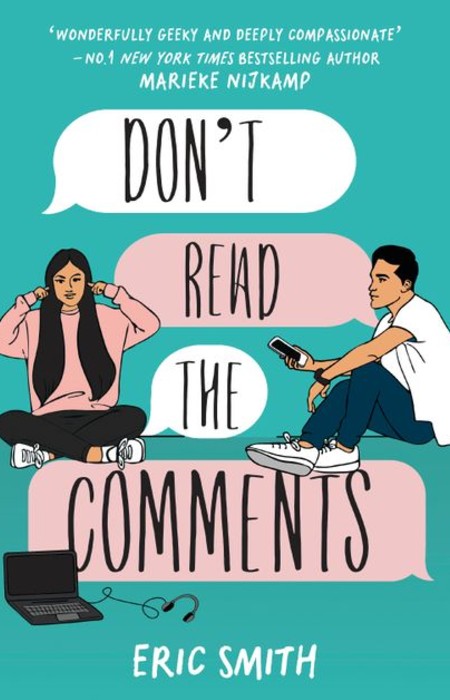
There is something about the pursuit of something you love, whether its gaming, reading, paragliding or cake making, which feels inestimably pure and lovely.
You are swept into this perfect place where great happiness and fulfillment resides, and where you step away from the rigours and demands of everyday life and just enjoy doing or consuming the thing you love.
In a kinder, simpler world, which ours most often is not, that would be that; devotees would love and enjoy what makes them happy, everyone else would respect that, content in doing what satisfies them, and everything could be allowed to hum along in some sort of mutually-contented continnum.
But delightful a picture as that is, it’s not realistic as Eric Smith’s starkly real but still uplifting and warmhearted debut novel Don’t Read the Comments, makes painfully clear.
There are those among us, most particularly in areas like gaming and superhero movie fandom, who cannot, for reasons known only to their dark and twisted souls, sit by and simply let quiet, unobtrusive joy light up someone’s world.
Consumed by god knows what – it is a lack of self-esteem, reactive bullying to being bullied themselves, a narcissistic soul from which no light can emerge? – these trolls go out of their way, often in a cruelly sustained fashion, to make their target’s life one of unending misery, not content to simply rob them of the joy of their passion of choice but to destroy their lives in ways that are horrifying to anyone with an actual beating heart.
“The end of June is only a few days away, which means the rent is due. How can my mom stand here and talk about me getting rid of my Glitch channel when it’s bringing in just enough revenue to help cover the rent? To pay for groceries? When the products I’m sent to review or sponsored to wear—and then consequently sell—have been keeping us afloat with at least a little money to walk around with?” (P. 9)
The target of the trolls in Don’t Read the Comments, a title taken from a wise admonition to ignore what people say underneath the videos or blog instalments you post, is popular streaming gamer Divya Sharma or D1V, who is the reigning player in Reclaim the Sun, as pure an online as there ever was, in which the goal is simply to find one of the trillions of empty planets in the universe, claim it as your own and if you want, and lots of people collaboratively do, work together with others to realise shared goals.
Divya certainly has her followers, the wonderfully-named Angst Armada, a grouping of almost a hundred likeminded souls who, in their snazzy customised spaceships, set off with D1V at the the front of the pack, and explore rich for the taking.
It’s an humane and deeply satisfyingly simple game in which getting to know others and working to benefit one another are the guiding principles, and together with Rebekah, her best friend and producer, Divya’s Glitch streaming events are not only hugely, sponsor product-attracting popular but a source of escapist joy for an eighteen-year-old high school senior with a huge amount on her plate.
Her dad has left her and her mum in venomously inamicable circumstances, forcing them into a pay check to pay check life in which Divya’s sponsorship gifts and the money she gets for selling them once the advertising period are over are the only things keeping them afloat until her mother finishes her studies and can finally embark on a well-paying career.
Reclaim the Sun then is Divya’s supremely happy place, more so after she meets sweet budding games designer Aaron who is battling his own loving parents’ expectations that he embark on a medical career just like his mum.

Slowly, ever so slowly they start hanging out in the game, flying to planets together and exploring worlds beyond their troubled own, and in the process getting to know each other.
This too, like the gaming passion they share, is a joyously uncomplicated thing until a coordinated group of trolls, the Vox Populi – a misbegotten name as ever there was since the Latin phrase means “the majority of the people” which these poisonous misogynists most definitely are not – begin to make Divya’s life a living hell.
In short order, they ruin her happy place with a sustained doxxing campaign (public revealing of private information), an act of wantonly, bullying cruelty that has spillover effects not simply in Divya’s life but also that of Rebekah’s and Aaron’s.
If this all sound oppressively bleak and dispiriting, in some ways it is; you are left open-mouthed in horror that anyone could treat another human being so horrendously and there are times when you fear for the future of humanity.
BUT, and this is an important “but” which speaks to the gorgeously life-affirming soul of this most bighearted of books, what Don’t Read the Comments also does is gloriously amplify how powerful love, friendship and community can be.
“My hand switches, and the fact that she isn’t here, in a seat next to me, weighs on me a little. The warmth in her voice, the fact that she’s here, but not. The urge to reach out and hold her hand in this movie theater feels so real, so present, and I have to push myself to keep staring straight ahead. At the screen. At John Cusack as he bumbles around, a romantic mess.
I look over at the empty seats in the VR and reach my hand out anyway.
And I wonder.
If she’s doing the same.” (P. 249)
Indeed if you were to assign a message to Don’t Read the Comments, and it is not necessarily or deliberately message book, though the intent of the narrative is clear, it is that while justice may not always be a straightforward proposition, either for Divya with her trolls or Aaron and best friend Ryan with a games developer who employs but never pays them, good, caring, garden variety humanity always is.
Selflessly loving and supporting someone, as Aaron does for Divya, Divya does for Rebekah and the Angst Aramada do for their beloved galactic leader, is an altogether powerful, transformative thing, an act of shared humanity so powerful that Hallmark cards and movies-of-the-week don’t come remotely close to conveying how powerful they are.
A love letter to geeky gaming culture and the community it engenders for the greater part, Don’t Read the Comments is a joy for all its grim realities because it realistically asserts that it is possible to beat the bullies and stand strong, making it clear that those kinds of acts are not fairytale flimsy but muscular and effectingly powerful.
It is easy when confronted with bullies and their blustering, militant tenacity to cower and shrink back afraid to counter them their hatred and mindless bigotry with a passion-enabling truth of your own, but as Divya fights back, and fights back in ways that will make you cheer and love her even more than you already do (she, Aaron, Ryan and Rebekah are very loveable characters), you come to appreciate in a story that wholly consumes your heart that taking a stand isn’t just possible but immensely liberating.
Don’t Read the Comments doesn’t pretend the world is a simple and kind place, in fact much of the time it almost inadvertently makes the opposite case by documenting things as they are, but what it does, brilliantly and affectingly well, is highlight the spirit-enlivening and uplifting power of humanity, friendship, romantic love, family and community and how that can beat the hate and enrich lives in ways that seem eminently and wonderfully possible and give you hope that light might just beat back the dark if there are enough Divya Sharmas in the world.